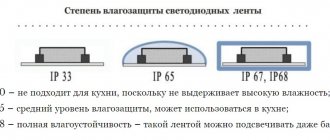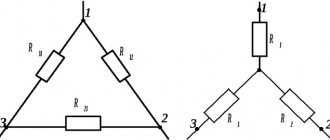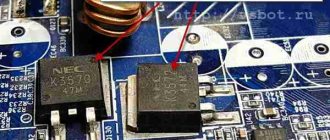In the life of every person, at one stage or another in life, the question of choosing a profession arises. This article is dedicated to those who, from many different areas of activity, have chosen the profession of an electrician. How to become an electrician? We will try to answer this question by considering all aspects of this profession.
A few words about making the right choice
Many people have shown interest in this profession since their school years. Some followed in the footsteps of relatives, while others simply like everything related to electricity - there are many options. You can always master this area of activity, like any profession. Not all electricians became electricians from the very beginning; for many people, the electrician profession may be their second, third, etc. in life, depending on the circumstances.
But in any case, an electrician is not just a person who has received an education, he is a person whose soul lies in this profession, for whom being an electrician is not just a job, but a part of life. That is, one should not consider the profession of an electrician solely as a way to earn money; nothing good will come of it. It is necessary to choose this direction of activity only if you really feel like it.
So, if you still decide to become an electrician, then the very first stage is choosing a specialization. This could be the profession of a power engineer at an energy supply company, servicing several distribution substations, an automotive electrician at a car service station, working in a private organization providing various electrical installation services - there are quite a lot of options, it all depends on local conditions, the prospects and prestige of the work at that or another enterprise.
Getting an education
In order to work in a particular profession, you must have not only knowledge, but also an appropriate document indicating the presence of the appropriate skills. Therefore, in the question of how to become an electrician, one of the most important stages is obtaining the appropriate education at an educational institution.
Of course, if you plan to work as an electrician for yourself, then having a diploma does not matter; in this case, knowledge and skills in carrying out work are important. But a novice electrician who has neither knowledge nor experience needs to start somewhere, and the starting point in this case will be working as an electrician at an enterprise. That is, you need to get an education in any case, since without a diploma they will not hire you for any enterprise.
In addition, studying at an educational institution allows you to gain basic theoretical knowledge in the electrical field, as well as the first practical skills in carrying out the work that the chosen specialty provides. It is impossible to learn all the information regarding the chosen direction during your studies at an educational institution, but a foundation of knowledge, a foundation, will be laid.
Each enterprise has its own nuances and peculiarities of work, and immediately after studying you will not be allowed to carry out work independently. Therefore, to obtain permission to work, it will be necessary to undergo appropriate training and knowledge testing.
Gaining practical skills
Most accomplished electricians received their first practical skills while working in their specialty at an enterprise. A novice electrician begins to perform his first work, applies and analyzes previously acquired knowledge. Communication with experienced workers and joint work allows you to accumulate your personal experience, acquire the necessary practical skills, and learn to apply your knowledge in practice.
The profession of an electrician is very dangerous and responsible, since the worker deals with such a dangerous phenomenon as electricity and maintains various equipment, which can cost from tens of thousands to several millions. Therefore, when working at the enterprise, special attention is paid to safety when performing work, and special emphasis is placed on responsibility, accuracy, discipline and diligence.
Thus, after working at an enterprise, an electrician not only acquires the necessary experience and practical skills, but also develops the qualities that a successful electrician should have.
Prospects for working as an electrician
The profession of an electrician is very versatile. There are many different areas of activity that are related to electricity. Some people work directly with electrical equipment - they install, operate or repair it, others occupy management positions or work as engineers mainly in the office, carrying out various calculations, analysis, and design.
Each of the specialties is irreplaceable, in this case there are no bad or good specialties - they, in general, constitute an integral working mechanism in which the links are interconnected and each of them performs its functions.
Considering the question of how to become an electrician requires perspective. Set a goal, not just master a certain direction, but strive for career growth. The main thing is to make the right choice, weigh the pros and cons of the chosen direction.
Or you can take a different path, working for yourself. When you have the necessary knowledge and experience in carrying out the work, you can provide services for electrical installation work. In the future, you can open your own company, hire specialists and provide electrician services, no longer taking small orders, but implementing large-scale projects at various enterprises.
Self-study
Self-study of a profession, in this case one of the areas of activity related to electrical engineering, involves obtaining theoretical and practical skills on your own. In modern conditions, with the presence of the Internet, anyone has access to a lot of information, articles, books, training courses that allow them to master any specialty.
But one should take into account the fact that self-learning is a rather complex process and requires proper self-organization, which is a big problem for many people.
Also, if you want to master a specialty through self-study, you should take into account that electricity and energy are a rather complex subject and many things cannot be mastered without outside help or explanation of the material by experienced specialists.
When learning on your own, you can misunderstand certain things, which in the future, when applying this knowledge in practice, can lead to gross mistakes, which, in turn, will lead to equipment damage or other negative consequences.
Therefore, you should not assume that you can easily master the profession of an electrician on your own. Self-education is important, but it will only be useful if there is a certain knowledge base, for example, acquired while studying at an educational institution.
In general, the nature of the electrician’s profession is such that he has to constantly study, learn new things, and improve his skills. That is, constant self-training for an electrician is an integral part of his work.
Read also: Where can I get carbide
Mention should also be made of correspondence courses in educational institutions. This method of teaching students is, in fact, self-study, since the student must study most of the material on his own. Correspondence education has a number of advantages compared to self-organized training.
First of all, this is the organization of the educational process - the training procedure developed by specialists and proven over the years, the amount of information studied. The second advantage is the availability of the necessary literature and equipment for conducting practical classes. Students are read the material in a condensed form, given practical exercises on the equipment, and given assignments and literature for self-study.
When following all the recommendations and studying the necessary material, the student receives the necessary knowledge base and the corresponding document on receipt of education. In the case of self-organization of the learning process, there will be neither a corresponding document on education nor the necessary knowledge base in such a volume as with distance learning.
Studying by correspondence is also good because the student has the opportunity to consult with experienced specialists and find answers to controversial issues. Testing knowledge in an educational institution allows you to assess the level of knowledge and, if necessary, find weaknesses or correct misconceptions about certain issues in electrical engineering.
The most important thing in this case is to find a good educational institution where you can really get knowledge, and not just a diploma.
In conclusion, we can conclude that in order to become an electrician, it is not enough to take a certain training course or simply receive the appropriate education. In order to become a good specialist, you need to gain not only theoretical knowledge, but also practical knowledge. As in any profession, theoretical knowledge that is not supported by experience means nothing.
In the course of his work, an electrician always learns something new, improves his skills, and makes responsible decisions. We should also not forget that the profession of an electrician is very dangerous when it comes to working directly with electrical equipment, electrical wiring, etc. Therefore, if you understand the dangers of working with electricity, are ready to study and practice a lot and, most importantly, have the desire, then you can become an electrician.
It is impossible to imagine life without electricity, and therefore without an electrician. But how to become an electrician from scratch, what do you need to know? Let's find out!
Since the days of oil lanterns and candelabra with candles have passed, people have become dependent on electricity.
At the city level, the problem of power outages is more frightening—shops, businesses, train stations, and airports cease to function.
Energy and power in electrical engineering
It is understandable that people of any age want to understand a science such as electrical engineering. The basics of electrical engineering will help with this for all beginners. A lot of materials are published on the Internet and in print, often under the title “Electrical engineering for dummies.” You need to start by mastering the provisions and laws of electricity.
Electrical Engineering Textbook
In electrical engineering, there are also such concepts as energy and power associated with Ohm’s law. Energy itself exists in mechanical, thermal, nuclear and electrical forms. According to the law of conservation of energy, it cannot be destroyed or created. It can only be transformed from one form to another. For example, audio systems convert electrical energy into sound and heat.
Any electrical appliance consumes a certain amount of energy over a set period of time. This value is individual for each device and represents power, that is, the amount of energy that a particular device can consume. This parameter is calculated using the formula P = I x U, the unit of measurement is the watt. It means moving one ampere by one volt through a resistance of one ohm.
Thus, the basics of electrical engineering for beginners will help you understand the basic concepts and terms at first. After this, it will be much easier to use the acquired knowledge in practice.
Concepts and properties of electric current
Electrical laws and formulas are required not only for carrying out any calculations. They are also needed by those who practically perform operations related to electricity. Knowing the basics of electrical engineering, you can logically determine the cause of the malfunction and eliminate it very quickly.
The essence of electric current is the movement of charged particles that transfer electric charge from one point to another. However, with the random thermal movement of charged particles, following the example of free electrons in metals, charge transfer does not occur. The movement of electric charge through the cross section of a conductor occurs only if ions or electrons participate in ordered movement.
Electric current always flows in a certain direction. Its presence is indicated by specific signs:
- Heating a conductor through which current flows.
- Change in the chemical composition of a conductor under the influence of current.
- Exerting force on neighboring currents, magnetized bodies and neighboring currents.
Electric current can be direct or alternating. In the first case, all its parameters remain unchanged, and in the second, the polarity periodically changes from positive to negative. In each half-cycle, the direction of the electron flow changes. The rate of such periodic changes is frequency, measured in hertz
Ohm's law
This law relates to the basic provisions and concepts of electrical engineering. It most accurately reflects the relationship between quantities such as current, voltage, resistance and power. The definitions of these quantities have already been considered; now it is necessary to establish the degree of their interaction and influence on each other.
In order to calculate this or that value, you must use the following formulas:
- Current strength: I = U/R (amps).
- Voltage: U = I x R (volts).
- Resistance: R = U/I (ohm).
The dependence of these quantities, for a better understanding of the essence of the processes, is often compared with hydraulic characteristics. For example, at the bottom of a tank filled with water, a valve with a pipe adjacent to it is installed. When the valve opens, water begins to flow because there is a difference between the high pressure at the beginning of the pipe and the low pressure at the end.
The current strength can be compared with the water flow, that is, the amount of water flowing through the cross-section of the pipe over a set period of time. As the pipe diameter decreases, the water flow will also decrease due to increased resistance. This limited flow can be compared to the electrical resistance of a conductor, which keeps the flow of electrons within certain limits.
What do you need to work as an auto electrician?
To work as an auto electrician
, you do not need to receive a higher or secondary specialized education; it is enough to take short-term courses, receive a certificate or diploma, and then undergo an internship at your future place of
work
.
Interesting materials:
What happens if you don't use a SIM card for a long time? What happens if you don't use a credit card for a long time? What happens if you don’t use your MTS SIM card for a long time? What happens if you don’t use a SIM card for a long time? What happens if you use someone else's card? What happens if someone finds out your bank card number? What happens if there is not enough money on the card to pay for a Yandex Taxi trip? What happens if you transfer dollars to a ruble card? What happens if you don't activate your credit card? What happens if you don’t use a Tele2 SIM card?
How long does it take to study to become an electrician?
Education in a secondary specialized educational institution allows you to acquire initial professional skills. There are enough of them to start working in your specialty after graduating from college or college.
You should enroll in a technical or construction educational institution with a specialty in “Electrician for the repair and maintenance of electrical equipment.” Upon admission, passing scores in Russian, mathematics and physics will be required. A big plus of the profession is the possibility of entering on a budget, since training in blue-collar jobs is one of the priority areas of the modern education system. There are always many budget places in technical colleges and schools.
The duration of training to become an electrician is determined by the initial level of education. After 9th grade, four years of study will be required. After grade 11, the duration of the training course is reduced by a year.
After starting work, the specialist continues his training: every five years he takes advanced training courses, more often - training in occupational safety issues. The need for advanced training in the industry is due to the specifics of work, as well as the constant improvement of electrical equipment, which a professional must “keep up with.”
pixabay.com/Michal Jarmoluk
How much does an electrician earn?
According to the employment portal, the average salary of an electrician in Russia is 41 thousand rubles. Specialists of 3–4 categories with more than a year of work experience can expect this salary. At the start of your career, earnings will be lower and will range from 14 thousand rubles. In commercial organizations, enterprises, and in the field of providing telecommunications systems, a young specialist can earn more - from 23 to 30 thousand rubles.
As your qualifications increase, your salary also increases. Employers are willing to pay experienced electricians 59–68 thousand rubles. The salary ceiling is 86 thousand rubles, this salary is offered to highly qualified specialists.
The average salary is higher for ship electricians, starting from 54 thousand rubles, as well as for those who work on a rotational basis at enterprises in the northern regions. According to statistics, employers in the Chukotka Autonomous Okrug are ready to offer the highest salaries in the industry.
Basic current quantities
When an electric current occurs in a circuit, a constant charge transfer occurs through the cross section of the conductor. The amount of charge transferred in a certain unit of time is called current, measured in amperes.
In order to create and maintain the movement of charged particles, it is necessary to have a force applied to them in a certain direction. If this action stops, the flow of electric current also stops. This force is called the electric field; it is also known as electric field strength.
It is this that causes a potential difference or voltage at the ends of the conductor and gives impetus to the movement of charged particles. To measure this value, a special unit is used - volts. There is a certain relationship between the basic quantities, reflected in Ohm's law, which will be discussed in detail.
The most important characteristic of a conductor directly related to electric current is resistance, measured in ohms. This value is a kind of resistance of the conductor to the flow of electric current in it. As a result of the influence of resistance, the conductor heats up. As the length of the conductor increases and its cross-section decreases, the resistance value increases. A value of 1 ohm occurs when the potential difference in the conductor is 1 V and the current is 1 A.
Federal News Agency / Advantages and disadvantages of the profession
The specialty has prospects for growth and development. After graduating from a college or technical school with a degree in electrician, the graduate is assigned a 2-3 category, which will increase as he gains experience and passes qualifying exams. As the rank increases, the specialist’s ability to work with electrical equipment of a higher complexity increases, and hence his earnings.
The limitation of the profession is the “career ceiling” if you only have a secondary education: with it, the pinnacle of your career will be the position of site foreman or team leader. To apply for the position of engineer, you will need a higher specialized education.
The main disadvantage of the profession is its high danger. Working with electrical equipment requires a clear understanding of the specifics, design of systems and thorough compliance with safety requirements. The slightest mistake and inattention can lead to serious injuries that pose a risk to life.
Where to begin?
Acquaintance with the necessary amount of knowledge will help a novice electrician to decide where to start mastering the profession. It should be sufficient to:
- be able to navigate well in the whole variety of electrical quantities and their units of measurement;
- understand electrical equipment operating as part of power supply systems;
- understand the operating principles of simple electrical circuits, as well as their constituent components.
In addition, a novice electrician needs to study and master the basic laws relating to the flow of current through linear circuits and the transmission of voltage through them. And in relation to the future profession, you will need to study special technical literature or go through the full cycle according to the program of the chosen institution.











